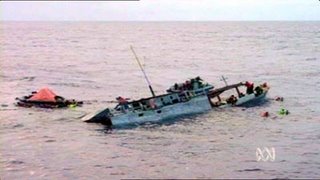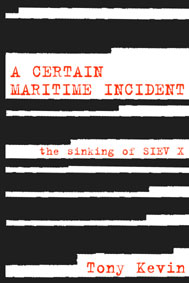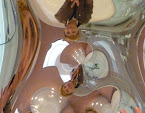
In October 2001, over 400 asylum-seekers departed from Indonesia in a grossly overcrowded, unseaworthy boat bound for Australia. Somewhere between the two countries the boat sank, with a terrible loss of life. 353 of the asylum-seekers drowned.The boat was known as the SIEV X.
The Australian government claimed it had no prior knowledge of the unfolding tragedy. Yet, from the beginning, government ministers and senior officials tried to mislead the Australian Senate and the community over important questions. What did the government and its agencies know about the boat and its fate, and when did they know? Did they have or should they have taken any responsibility for the tragedy? Did they have a duty of care that they shirked ?
This weekend a public memorial will be held in the Australian Capital Canberra to mark the fifth anniversary of this tragic incident:
Siev X Memorial Ceremony and Raising of the Poles
Weston Park
Yarralumla
Canberra
2 pm Sunday 15 October 2006
Ex- Australian-ambassador to Cambodia and Poland, Tony Kevin wrote an investigative book about the sinking of the SIEV X - A Certain Maritime Incident, published by Scribe in 2004. The book revealed a disquieting record of government misconduct, including Australian Federal Police involvement in a people-smuggling 'disruption program', and an extraordinary combination of stone-walling and professed ignorance by a government dedicated to micro-managing the deterrence of asylum-seeker voyages.
Many of the victims of this disaster have family members living in Australia on temporary protection visas. This book is dedicated to them. It is also for the rest of us because, Tony Kevin argues, nothing less than a comprehensive judicial enquiry into the sinking of SIEV X will suffice if Australia is to regain its national honour.

Tony Kevin retired from the Department of Foreign Affairs and Trade in 1998, after a thirty-year public service career. He served in the Prime Minister's Department, and was Australia's ambassador to Poland and Cambodia. He is currently an honorary visiting fellow at the ANU Research School of Pacific and Asian Studies. He has written extensively on Australian foreign, national security and refugee policies in Australia's national print media, including Eureka Street, Canberra Times, the Age, Sydney Morning Herald, the Australian, and Australian Financial Review.
He has also recently written a critique of the proposed Australian Values and English Test that Sylvia Lawson also covered recently - blogged here on The Deletions.
A letter to the editor of The Sydney Morning Herald Newspaper on this topic was published yesterday :
Language test for immigrants is a smokescreen
(October 13, 2006)
I write concerning the proposal that immigrants must speak English.
A language test on immigrants harks back to the dark days of white supremacy in Australia, and the test will prove absolutely nothing about immigrants' ability to integrate.
One of my happiest days in the Australian foreign service was December 5, 1972, with the end of the White Australia Policy.
To that time the Australian government excluded non-white immigrants by testing them in a language they did not know.
I have lived in non-English-speaking countries and understand how hard it is for the first generation of immigrants to operate in a second language. As any immigrant family will tell you, it is the second generation who become the native speakers of English, while all are part of the community in their own way.
My wife is an immigrant who speaks English. She has degrees in French, Russian and Chinese literature from the University of Michigan, University of California, Berkeley, and the Sorbonne.
She has more letters after her name than are in her name. You would think she is the sort of well-educated person Australia would welcome. However, her Australian experience was hellish. She wanted to integrate, but Australians, by and large, would not allow that.
That said, she and I made many dear Australian friends, but because of the attitude of the community at large, we prefer to stay out of Australia and make the occasional return trip to see friends and family.
My wife and I have become expatriates not because her language skills did not allow her to integrate and take on Australian values but because the pure merinos, the Australian-born Australians, were so uniformly hostile to her.
Is Australia ready for well-educated, white-collar immigrants? Are Australians ready to compete with them for jobs?
If not, how does Australia hope to allow them to make a life for themselves in Australia? Will these well-educated, English-speaking immigrants be satisfied making beds in hotels and serving in fish-and-chip shops?
The matter of English testing falls in the field of language policy and this debate needs to be informed by experts in that field.
The English language test is a smokescreen. In our experience the real problemf for immigrants trying to integrate into Australian society is the Australians, who are denying the values of those who seek to live there.
Geoffrey Thomas, Kinshasa, Democratic Republic of Congo

No comments:
Post a Comment